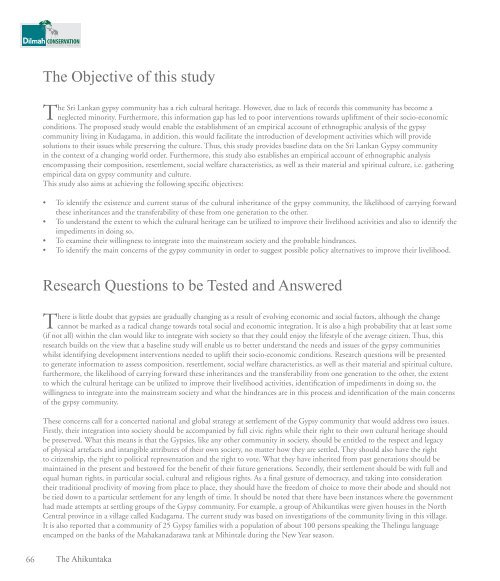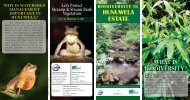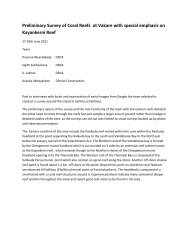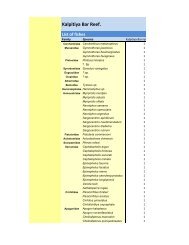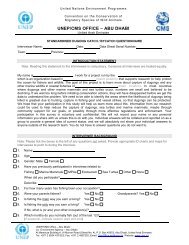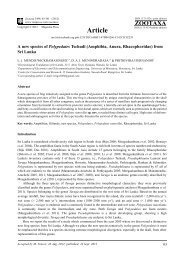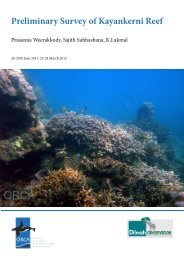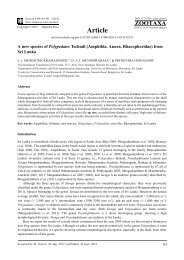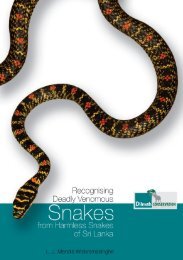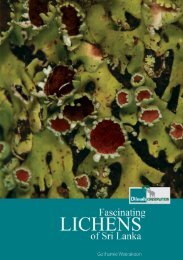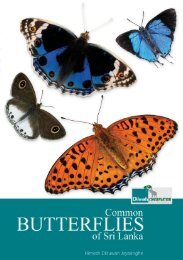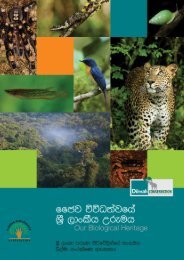The Ahikuntaka
A publication documenting the lives and livelihoods of the Ahikuntaka or gypsy community in Sri Lanka. A collection of vibrant photographs and a baseline survey on the current socio economic status of the Ahikuntaka conducted by the Colombo University complement this timely publication.
A publication documenting the lives and livelihoods of the Ahikuntaka or gypsy community in Sri Lanka. A collection of vibrant photographs and a baseline survey on the current socio economic status of the Ahikuntaka conducted by the Colombo University complement this timely publication.
You also want an ePaper? Increase the reach of your titles
YUMPU automatically turns print PDFs into web optimized ePapers that Google loves.
www.dilmahconservation.org<br />
<strong>The</strong> Objective of this study<br />
<strong>The</strong> Sri Lankan gypsy community has a rich cultural heritage. However, due to lack of records this community has become a<br />
neglected minority. Furthermore, this information gap has led to poor interventions towards upliftment of their socio-economic<br />
conditions. <strong>The</strong> proposed study would enable the establishment of an empirical account of ethnographic analysis of the gypsy<br />
community living in Kudagama, in addition, this would facilitate the introduction of development activities which will provide<br />
solutions to their issues while preserving the culture. Thus, this study provides baseline data on the Sri Lankan Gypsy community<br />
in the context of a changing world order. Furthermore, this study also establishes an empirical account of ethnographic analysis<br />
encompassing their composition, resettlement, social welfare characteristics, as well as their material and spiritual culture, i.e. gathering<br />
empirical data on gypsy community and culture.<br />
This study also aims at achieving the following specific objectives:<br />
• To identify the existence and current status of the cultural inheritance of the gypsy community, the likelihood of carrying forward<br />
these inheritances and the transferability of these from one generation to the other.<br />
• To understand the extent to which the cultural heritage can be utilized to improve their livelihood activities and also to identify the<br />
impediments in doing so,<br />
• To examine their willingness to integrate into the mainstream society and the probable hindrances.<br />
• To identify the main concerns of the gypsy community in order to suggest possible policy alternatives to improve their livelihood.<br />
Research Questions to be Tested and Answered<br />
<strong>The</strong>re is little doubt that gypsies are gradually changing as a result of evolving economic and social factors, although the change<br />
cannot be marked as a radical change towards total social and economic integration. It is also a high probability that at least some<br />
(if not all) within the clan would like to integrate with society so that they could enjoy the lifestyle of the average citizen. Thus, this<br />
research builds on the view that a baseline study will enable us to better understand the needs and issues of the gypsy communities<br />
whilst identifying development interventions needed to uplift their socio-economic conditions. Research questions will be presented<br />
to generate information to assess composition, resettlement, social welfare characteristics, as well as their material and spiritual culture,<br />
furthermore, the likelihood of carrying forward these inheritances and the transferability from one generation to the other, the extent<br />
to which the cultural heritage can be utilized to improve their livelihood activities, identification of impediments in doing so, the<br />
willingness to integrate into the mainstream society and what the hindrances are in this process and identification of the main concerns<br />
of the gypsy community.<br />
<strong>The</strong>se concerns call for a concerted national and global strategy at settlement of the Gypsy community that would address two issues.<br />
Firstly, their integration into society should be accompanied by full civic rights while their right to their own cultural heritage should<br />
be preserved. What this means is that the Gypsies, like any other community in society, should be entitled to the respect and legacy<br />
of physical artefacts and intangible attributes of their own society, no matter how they are settled. <strong>The</strong>y should also have the right<br />
to citizenship, the right to political representation and the right to vote. What they have inherited from past generations should be<br />
maintained in the present and bestowed for the benefit of their future generations. Secondly, their settlement should be with full and<br />
equal human rights, in particular social, cultural and religious rights. As a final gesture of democracy, and taking into consideration<br />
their traditional proclivity of moving from place to place, they should have the freedom of choice to move their abode and should not<br />
be tied down to a particular settlement for any length of time. It should be noted that there have been instances where the government<br />
had made attempts at settling groups of the Gypsy community. For example, a group of Ahikuntikas were given houses in the North<br />
Central province in a village called Kudagama. <strong>The</strong> current study was based on investigations of the community living in this village.<br />
It is also reported that a community of 25 Gypsy families with a population of about 100 persons speaking the <strong>The</strong>lingu language<br />
encamped on the banks of the Mahakanadarawa tank at Mihintale during the New Year season.<br />
66 <strong>The</strong> <strong>Ahikuntaka</strong>


